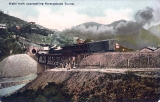Ohinemuri Regional History Journal 33, September 1989
"Waikino was a wonderful place to grow up in", said a former resident of Waikino, Mrs. Dorrie Clarkson (nee Maiden) now living in Kohimarama, Auckland. When she went to Auckland she joined a Waikino Club and they have had some wonderful evenings, she said. They were all so happy and wondered if it was because their fathers all worked at the Battery. Their mothers all knew each other and they were all like one big happy family.
Mrs. Clarkson was one of a big family of nine and her mother used to have to cut six lunches. Mr. Reid was the school teacher at that time and she recalls that he was a wonderful teacher who taught them some lovely songs. The theme song for the Waikino 'do's' in Auckland was 'The Tui Song' which, she said, never lost its attraction. There were school picnics and concerts with some of the children being good performers.
On Guy Fawkes Day their father built them a man of straw and they took him out on a trolly to go round collecting for the Guy. Their mother would then buy all the fireworks from Mrs. Currie and they had a big fire at their place with all the parents joining in. Her mother made supper for the adults who had it inside while the kids had theirs outside in the summer house.
They always had a great admiration for their father because they had swings, a seesaw, fowls and chicks, ducks and ducklings, a parrot, a dog, cats and even a nanny goat.
Mrs. Clarkson said that she would never forget her memories of Waikino and all the lovely people there and especially her mother and father, Mr. and Mrs. Willie Maiden.
* * *
Mrs. Ida Robinson (nee Bell) now of Westmere, Auckland, recalls her young days in Waikino.
She was born in Waitekauri and remembers her first school picnic there. "We arrived at the paddock dressed in our best with white pinafores and white starched hats all ribbons and frills. May [my? – E] aunt was waiting for us with her baby in a high, old-fashioned pram and she was dressed in a white silk blouse and heavy black serge skirt touching the ground. As we approached her I saw, coming towards us, an object with black face and a high red and white striped hat with a multi-coloured outfit. As he came closer, I became terrified and just couldn't refrain from screaming. My aunt said, 'Quickly, get under my skirt'. I remained there in fear and trembling for some minutes till I was coaxed out to get a lolly. There were two coloured material bags of lollies left on the pram for me. In those days there were no plastic sweet bags and the women made them up from left-over dress material of every colour. They then filled them with lollies and attached them to the lolly funny man's outfit".
"Next the old school bell rang out and all the children formed a huge circle and sat down with legs and feet pointing towards the centre. Then several women with large enamel jugs poured drinks into the mugs which the children had brought from home. Other ladies followed with dishes of large ham sandwiches and later bananas and apples cut in halves. The afternoon was spent running races and lolly scrambles. A big day in any child'slife."
Mrs. Robinson also remembers Friday afternoons at Waikino School, when they all assembled to salute the flag and sing the National Anthem. Later the girls went to sewing class. All was quiet and peaceful until they heard a pitiful scream and strange noises coming from the cloakroom. Some of the older girls stood up and peered through the glass panels in the door. They urged her to run out because the Headmaster there thrashing her brother - a quiet well-behaved little boy of nine years - not with a strap but with a long supplejack. That was because in the exam, he did badly in arithmetic. In those days the teacher was believed to be never wrong and so they never ever took any tales home. When she reached the front gate at home she waited for her brother to arrive and he looked very miserable. "Don't tell Mum and Dad, will you?" he said. It was later that her mother met one of the pupil teachers in the street and she heard about it. She (the pupil teacher) said she didn't know how she refrained from doing something to bring that man to his senses.
"About 50 years later some new people came to manage our local dairy", said Mrs. Robinson. "I wished them well and asked the gentleman if he had always lived in Auckland. No, he had spent his early days in a little place called Owharoa. I told him I came from Waikino and asked him who was the Schoolmaster when he was there. He immediately undid his shirt cuff and said, 'See that scar?' He also must have been a very little boy when he was so cruelly treated by that same Headmaster."

